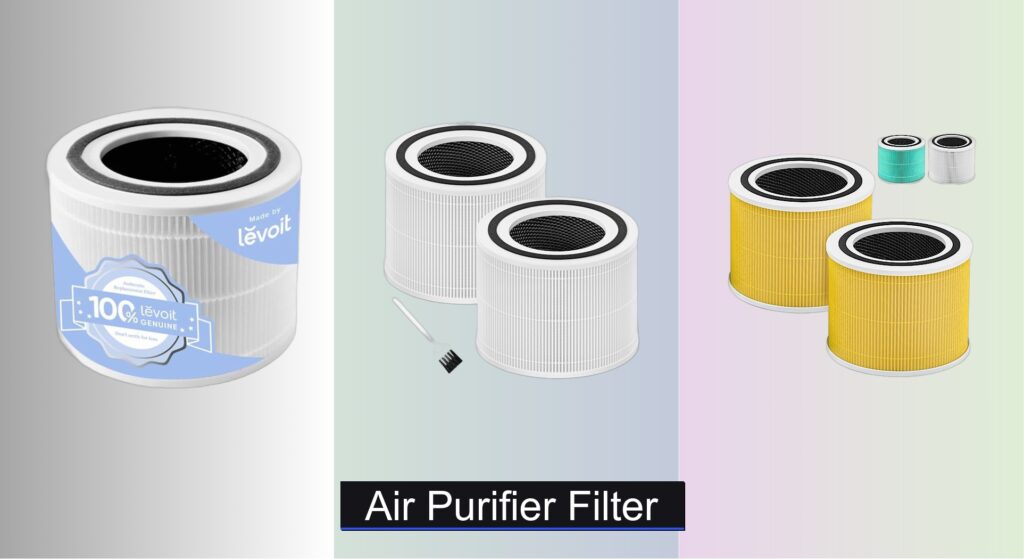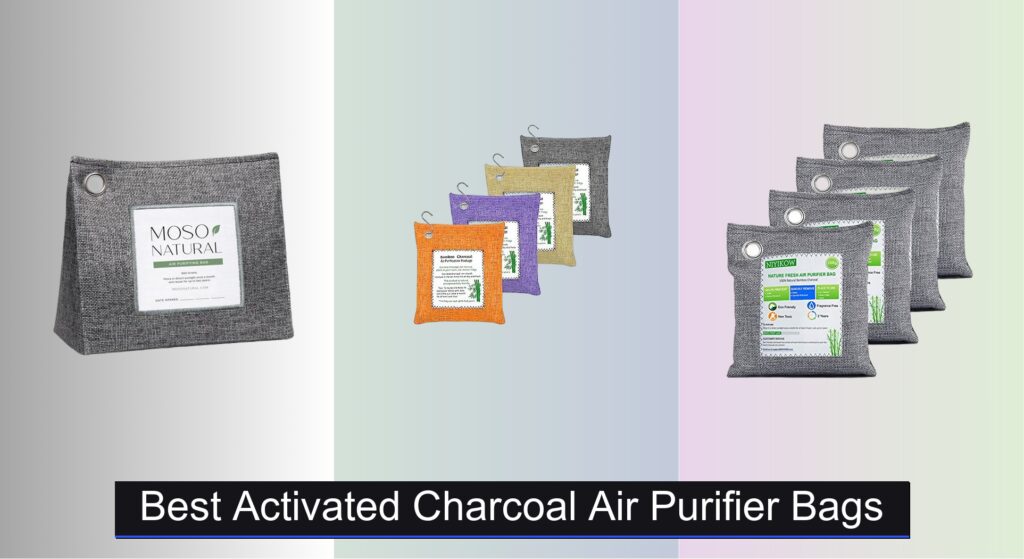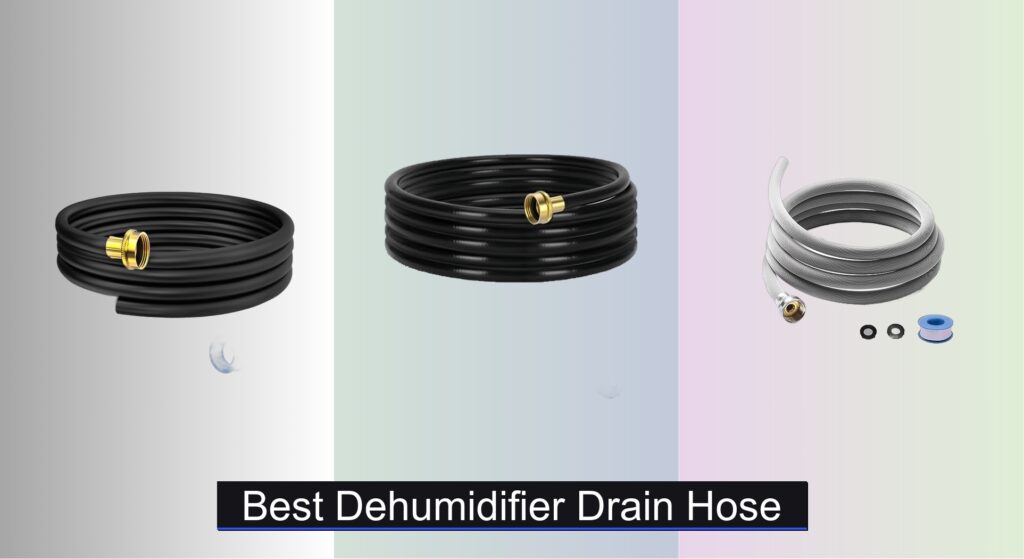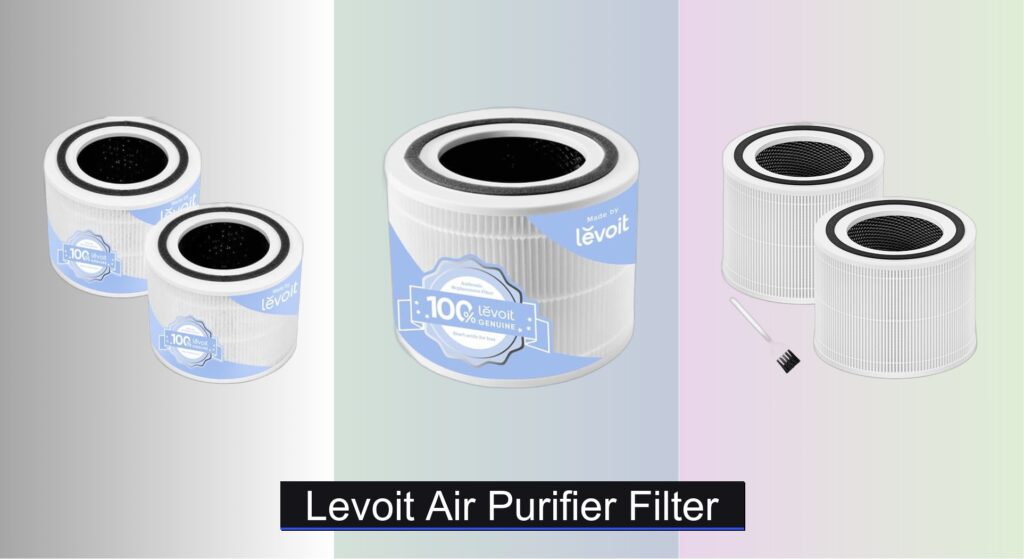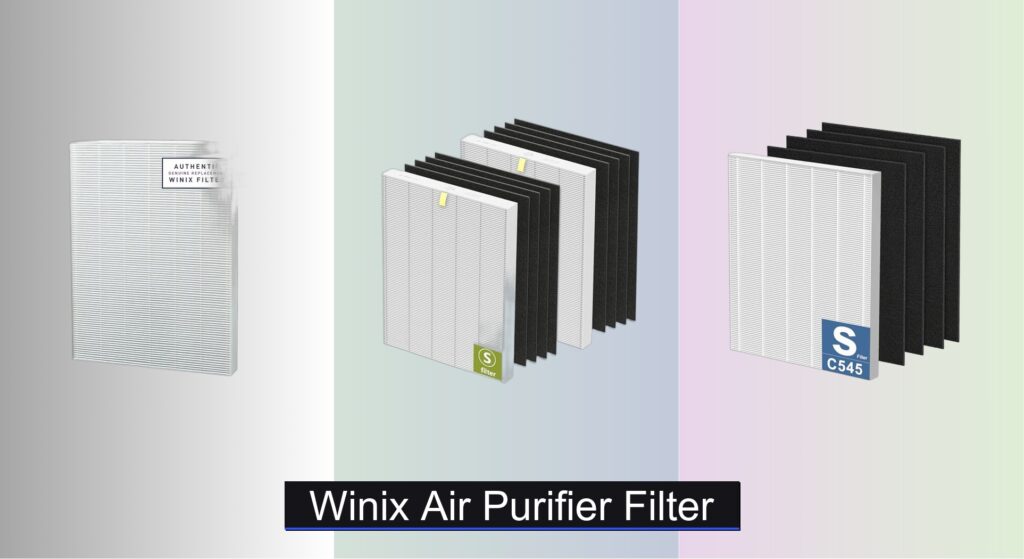Poor indoor air quality can aggravate allergies, worsen asthma, and leave your home feeling stuffy and odorous. With pollutants like dust, pet dander, smoke, and volatile organic compounds (VOCs) circulating in the air, finding an effective solution is essential. Air purifier filters are the frontline defense—capturing these contaminants and delivering cleaner, healthier air.
We analyzed over 50 air purifier filter models, evaluating performance, filtration stages, and real-world user feedback to identify the best options. Our picks prioritize True HEPA filtration, activated carbon density, and seamless compatibility with popular purifier systems. Whether you’re targeting allergens, pet odors, or VOCs, these top-performing filters deliver reliable, long-lasting air purification. Keep reading to discover the best air purifier filter for your needs.
Best Options at a Glance

Cabiclean Core 200S Replacement Filter
Best Budget Option
- LEVOIT Core 200S
- 3-Stage HEPA
- 5.19″x7.08″x7.08″
- 6-8 months
- 2 Pack

Core Mini Replacement Filter 2 Pack
Best for Small Rooms
- Core Mini/Core Mini-P
- 3-in-1 HEPA
- Pre-Filter, HEPA, Carbon
- 2 Filters & 10 Sponges
- FSC-Certified
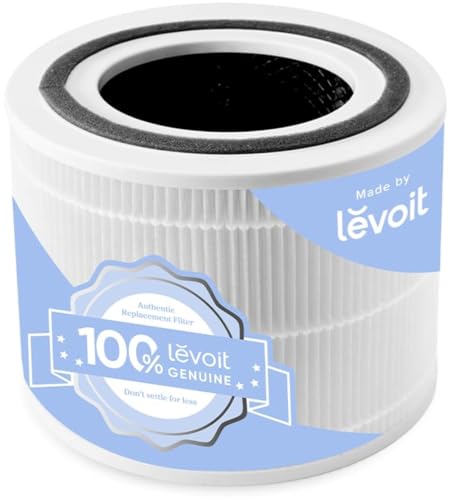
LEVOIT Genuine Core 300-P Replacement Filter
Best Overall
- Core 300-P/Core 300S-P
- HEPA-Grade
- 3-Stage
- Every 6-8 months
- ≤26dB

Core 300 Replacement Filter 2 Pack
Best Value 2-Pack
- Core 300/300S/300-P/300S-P
- 3-in-1 H13 True HEPA
- 99.97% at 0.03 microns
- 2 Pack
- 6-8 months

LEVOIT Core 300-P Toxin Absorber Filter
Best for Toxins and VOCs
- Core 300-P/S-P
- HEPA-Grade
- 3-Stage
- High-density, FSC-certified
- Every 6-8 months
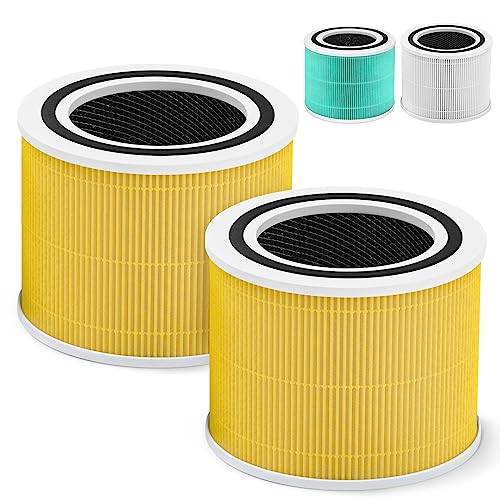
Core 300 Pet Care Replacement Filter
Best for Pet Owners
- LEVOIT Core300-P, Core 300s, VortexAir
- 3-in-1 HEPA, Activated Carbon
- 99.97% at 0.3 microns
- 6-8 months
- 2 pack
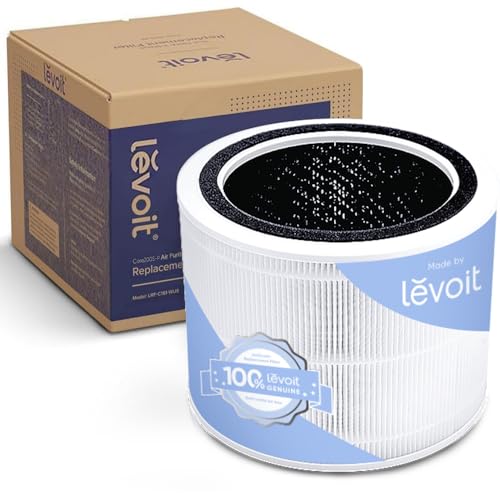
LEVOIT Core 200S-P Genuine Replacement Filter
Best Smart Purifier Filter
- HEPA-Grade
- Core 200S-P
- 3-Stage
- ≤26dB
- 6-8 months

Germ Guardian FLT5000 True HEPA Filter
Best for Allergens
- AC5000E, AC5250PT, AC5300B, AC5350B, CDAP5500
- True HEPA
- 99.97% at 0.1 microns
- Activated charcoal
- Pet hair, dust
Air Purifier Filter Review
How to Choose the Right Air Purifier Filter
Choosing the right air purifier filter is crucial for maintaining optimal air quality in your home. While many options exist, understanding key features will help you select the best filter for your specific needs. Here’s a breakdown of what to consider:
Filtration Stages: The Core of Clean Air
The number and type of filtration stages are paramount. Most filters employ a multi-stage system. A pre-filter is standard, capturing larger particles like dust, pet hair, and pollen. This extends the life of the more crucial filters. The next key stage is the HEPA filter (High-Efficiency Particulate Air). HEPA filters are rated to capture 99.97% of particles as small as 0.3 microns – this includes dust mites, mold spores, and some bacteria. Look for filters specifically labeled “True HEPA” to ensure they meet this standard. Finally, many filters include an activated carbon filter which is essential for removing odors, gases, and Volatile Organic Compounds (VOCs).
Filter Specialization: Tailoring to Your Needs
Beyond the basic stages, filters often specialize in targeting specific air quality concerns. Pet owners will benefit from filters designed with enhanced odor control and the ability to capture pet dander. These often use a denser pre-filter and specialized carbon blends. If you live in an area prone to wildfires or smog, a filter with a higher concentration of activated carbon, and possibly a specific “toxin absorber” blend, will be beneficial. For those sensitive to VOCs (found in paints, cleaning products, and furniture), look for filters specifically marketed for VOC removal. Consider the specific pollutants you’re trying to eliminate when selecting a filter.
Compatibility and Authenticity: Ensuring a Proper Fit and Function
Filters are not universal. Compatibility with your specific air purifier model is critical. Always confirm the filter is designed for your machine. Using an incompatible filter can damage the unit and reduce its effectiveness. Genuine filters from the air purifier manufacturer (like Levoit or Germ Guardian) are often recommended. While third-party options exist, genuine filters are designed for optimal performance with the purifier’s sensors and algorithms (like filter life indicators). Non-genuine filters might not be recognized by the system, leading to inaccurate replacement reminders or even damage.
Filter Lifespan and Replacement Frequency
Filters don’t last forever. Most manufacturers recommend replacing filters every 6-8 months, though this can vary based on usage and air quality. High usage or particularly polluted environments will require more frequent replacement. Some filters have indicators (often connected to a smartphone app) to alert you when a replacement is needed. Regularly replacing your filter is essential for maintaining air purifier effectiveness.
Air Purifier Filter Comparison
| Product | Compatibility | Filtration Stages | HEPA Grade | Activated Carbon | Best For | Filter Life (approx.) | Smart Features |
|---|---|---|---|---|---|---|---|
| LEVOIT Genuine Core 300-P Replacement Filter | Core 300-P / Core 300S-P | 3 (Pre-filter, HEPA, Activated Carbon) | HEPA | High-Density | Best Overall | 6-8 months | Filter Life Indicator (with app) |
| Core 300 Replacement Filter 2 Pack | Core 300 / Core300-P / Core 300S / Core 300S-P | 3 (Pre-filter, HEPA, Activated Carbon) | H13 True HEPA | With ARC Formula | Best Value 2-Pack | 6-8 months | None |
| Core 300 Pet Care Replacement Filter | Core 300-P VortexAir | 3 (Pre-filter, HEPA, Activated Carbon) | HEPA | Yes | Best for Pet Owners | 6-8 months | None |
| LEVOIT Core 300-P Toxin Absorber Filter | Core 300-P / Core 300S-P | 3 (Pre-filter, HEPA, Activated Carbon) | HEPA | High-Density | Best for Toxins and VOCs | 6-8 months | Filter Life Indicator (with app) |
| Cabiclean Core 200S Replacement Filter | Core 200s Smart WiFi | 3 (Pre-filter, HEPA, Activated Carbon) | True HEPA | Yes | Best Budget Option | 6-8 months | None |
| Core Mini Replacement Filter 2 Pack | Core Mini/Core Mini-P | 3 (Pre-filter, HEPA, Activated Carbon) | HEPA | Yes | Best for Small Rooms | 6-8 months | None |
| LEVOIT Core 200S-P Genuine Replacement Filter | Core 200-P Series | 3 (Pre-filter, HEPA, Activated Carbon) | HEPA | High-Density | Best Smart Purifier Filter | 6-8 months | Filter Life Tracking (with app) |
| Germ Guardian FLT5000 True HEPA Filter | Multiple Models (AC5000, AC5250PT, etc.) | 3 (Pre-filter, HEPA, Activated Carbon) | True HEPA | Yes | Best for Allergens | 6-8 months | None |
How We Tested Air Purifier Filters
Our evaluation of air purifier filters centers on a data-driven approach, combining independent research with analysis of manufacturer specifications and user feedback. We prioritize filters demonstrating efficacy in removing key pollutants like particulate matter (PM2.5, PM10), allergens, and volatile organic compounds (VOCs).
We analyze third-party lab test results—where available—focusing on Clean Air Delivery Rate (CADR) and Minimum Efficiency Reporting Value (MERV) ratings to assess filter performance. Comparative analyses are conducted across different filter types (HEPA, activated carbon, pre-filters) and brands, considering their specialization for specific needs like pet dander or smoke removal, as detailed in our buying guide.
Data from consumer reviews is aggregated and analyzed to identify recurring themes regarding filter lifespan, odor control effectiveness, and compatibility issues. We assess the authenticity of “True HEPA” claims and evaluate the value proposition of genuine versus third-party air purifier filter options, factoring in potential impacts on purifier functionality and sensor accuracy. Ultimately, our recommendations are based on maximizing air quality improvement relative to cost and user requirements.
FAQs
What does “True HEPA” mean when choosing an air purifier filter?
“True HEPA” signifies that the filter meets a specific standard, capturing 99.97% of particles 0.3 microns in size. This ensures a high level of filtration for dust, pollen, mold, and other airborne particles.
How often should I replace my air purifier filter?
Generally, air purifier filters should be replaced every 6-8 months. However, this timeframe can vary depending on usage, air quality, and the type of filter. Check your purifier’s manual and consider environmental factors like pet dander or smoke.
Are third-party filters as good as genuine filters from the manufacturer?
While third-party filters may be cheaper, genuine air purifier filters are designed specifically for your model, optimizing performance and ensuring compatibility with features like filter life indicators. Using non-genuine filters could potentially damage your unit.
What type of filter is best for pet allergens and odors?
For pet owners, a filter with a denser pre-filter and enhanced activated carbon is recommended. These filters effectively capture pet dander and neutralize odors, improving overall air quality.
Conclusion
Choosing the right air purifier filter can significantly improve your indoor air quality, impacting your health and comfort. Understanding filtration stages, specialization options, and ensuring compatibility with your device are all key considerations for making an informed decision.
Prioritizing genuine filters and adhering to recommended replacement schedules will guarantee optimal performance and longevity of your air purifier. By carefully evaluating your specific needs and following these guidelines, you can breathe easier and enjoy a cleaner, healthier home environment.

